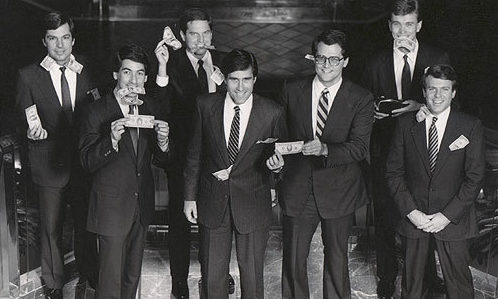• For the most part, poor people in America (and most other places) are rich people without money. Many try to pin moral failings on those who are struggling, but plenty of folks who’ve inherited wealth have drug and drinking problems, mental-health issues, divorces and other challenges. They just have a cushion to (usually) prevent them from falling painfully and finally to the ground.
• David Brooks has a tendency to get practically orgasmic about American meritocracy, about how our best and brightest walk in the halls of power educationally and beyond. It seems a cruel myth. Many of the students in these institutions are very intelligent (though not Jared Kushner, whose felon father purchased him a seat at Harvard), but the attendees have often been bolstered by a specific type of background that allows them to fully develop their skills and match them to expectations. Money is often part of the equation. Luck matters.
• Standardized tests were established in the U.S. on the strength of meritocratic impulses, the hope of finding diamonds in the rough, but they’ve long since been stripped of their egalitarian origins. Expensive tutors, test-prep courses and other means of tipping the balance have un-leveled the playing field. And there are perfectly intelligent young people who culturally aren’t prepared for these exams but could flourish in the right environment.
• The lack of equality ventures beyond school and work, existing, very dangerously, in courts and prisons. In addition to the two sets of justice that exist based on black and white in America, another one is divided by the colors of collars. Donald Trump can launder money and commit all manner of ethically dubious behavior and never spend a day behind bars, while Jeff Sessions envisions even more private prisons full of those without money for good lawyers who’ve committed low-level crimes. The Attorney General is now in position to see these dark dreams come to fruition.
From “Stop Pretending You’re Not Rich,” Richard Reeves’ NYT op-ed which argues the problem goes beyond the 1%:
I always found the class consciousness of Britain depressing. It is one of the reasons we brought our British-born sons to America. Here, class is quaint, something to observe in wonder through imported TV shows like Downton Abbey or The Crown.
So imagine my horror at discovering that the United States is more calcified by class than Britain, especially toward the top. The big difference is that most of the people on the highest rung in America are in denial about their privilege. The American myth of meritocracy allows them to attribute their position to their brilliance and diligence, rather than to luck or a rigged system. At least posh people in England have the decency to feel guilty.
In Britain, it is politically impossible to be prime minister and send your children to the equivalent of a private high school. Even Old Etonian David Cameron couldn’t do it. In the United States, the most liberal politician can pay for a lavish education in the private sector. Some of my most progressive friends send their children to $30,000-a-year high schools. The surprise is not that they do it. It is that they do it without so much as a murmur of moral disquiet.
Beneath a veneer of classlessness, the American class reproduction machine operates with ruthless efficiency.•

